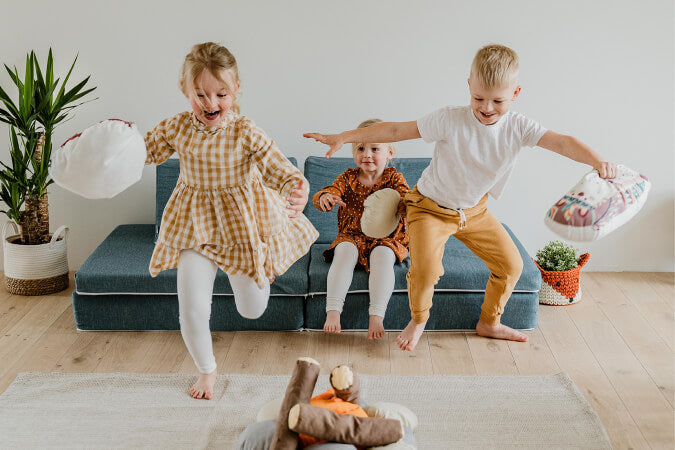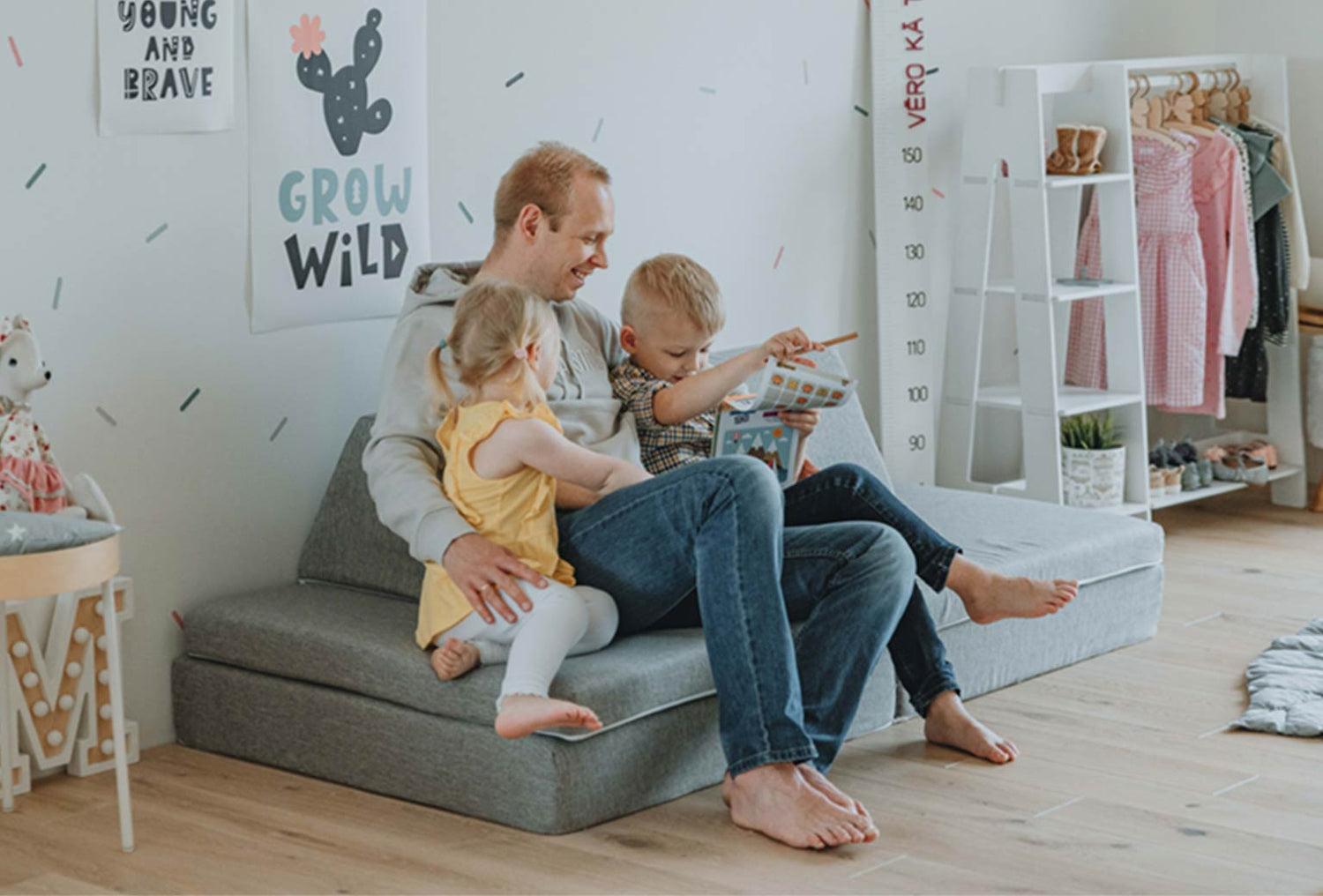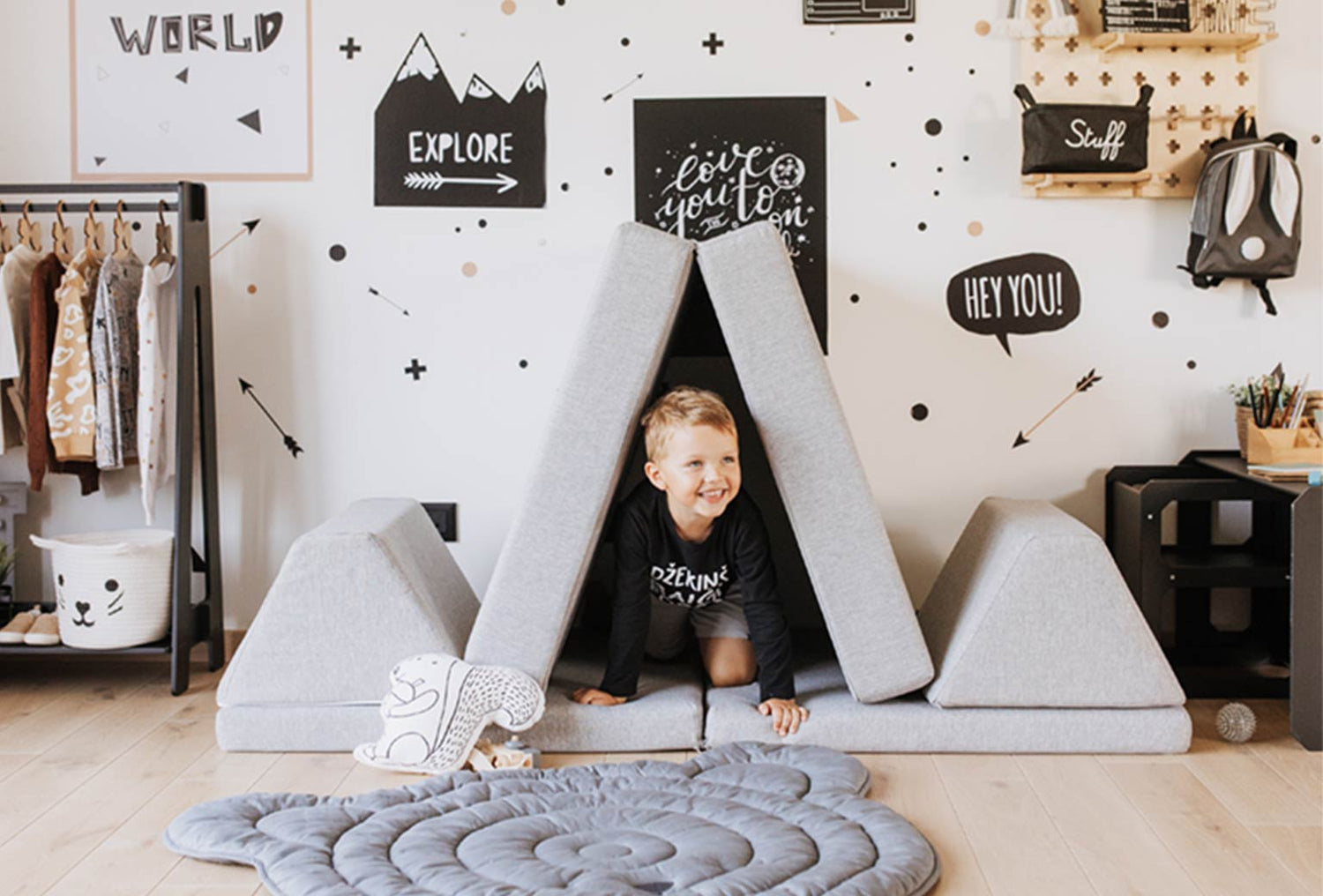Imagination fuels childhood, transforming everyday objects into gateways to magical worlds. A simple cushion can become the walls of a grand castle, a blanket can serve as the canopy of a forest hideout, and a play sofa can turn into a spaceship ready to explore the cosmos. From building forts to going on space missions, pretend play is fun and vital to child development. It gives a unique platform for children to experiment with roles, scenarios, and outcomes, building different developmental skills.
In this post, we’ll dive into how pretend play can help our kids grow and learn in many ways, like building forts and going on space adventures. Through imaginative play, kids solve problems, express themselves, and work together with friends—all while having tons of fun! The best part? These playful moments are building blocks for their future success. Come along and explore how a play sofa can significantly boost early learning and development, turning ordinary playtime into extraordinary opportunities for growth.
We created our play sofa or activity couch brand to give our three children the best of both worlds – a fun and cozy sofa they can use however they like and the added benefits that come along with using a play couch for open-ended play time. To get a better idea of what a play sofa is, take a look at our creation – Monboxy.
The Importance of pretend play
Pretend play, or imaginative play, is when kids create stories and roles. They often use everyday objects to represent something else. Remember when a simple cardboard box became a pirate ship or a superhero’s headquarters? This type of play is crucial for their growth. It helps their minds, social skills, and emotions. It’s like a secret growth recipe packed with learning and fun. As parents, we play a crucial role in encouraging this kind of play.
Through pretend play, children can experiment with the world around them. They might pretend to be teachers, chefs, or brave astronauts exploring space. By stepping into these roles, they learn about different jobs and duties and develop essential life skills. It’s amazing.
A simple fort or playing doctor can teach them to:
- Solve problems
- Empathize
- Manage their feelings
Plus, it’s a fantastic way for them to learn how to communicate and collaborate with others. So, when you see your child at play, know this: They’re not just having fun. They’re building a lifelong foundation for learning and growth. And you’re a key player in this process.
Cognitive benefits of open-ended play
Problem-solving skills
When kids transform a play sofa into a fort or a spaceship, they encounter challenges that require problem-solving. They decide how to build their fort for stability. Or how to navigate their spaceship through an asteroid field. These scenarios help develop critical thinking and decision-making skills.
Imagine your child turning the sofa cushions and pillows into the sturdy walls of a fort. They have to figure out which pieces fit best together, ensuring the structure doesn't collapse. This process involves trial and error, testing different setups, and learning from mistakes. They might realize that the largest cushions at the base provide a solid foundation. Lighter pillows on top could prevent the fort from toppling. Each decision they make improves their grasp of cause and effect, spatial awareness, and basic engineering.
Now, picture them pretending the same sofa is a spaceship. As they navigate their imaginary journey through space, they might face obstacles like asteroid fields or alien encounters. To get through safely, they need to strategize and make quick decisions. Should they steer left or right to avoid the asteroids? How fast should they go? Should they hide or communicate when they spot an alien spaceship? These scenarios test their ability to think on their feet. They must weigh options and anticipate consequences, which are vital to critical thinking.
Moreover, these problem-solving adventures aren't just solitary activities. Children often play with siblings or friends, which adds a social dimension to their play. This not only makes the play more enjoyable but also adds complexity to their problem-solving tasks. They must share their ideas, listen to suggestions, and agree on the best action. This aspect of play hones their problem-solving and social skills. It also boosts their negotiation skills, fostering their growth.
These exercises teach kids that challenges can be fun. They also learn that persistence pays off. They develop resilience, creativity, and a proactive attitude toward problem-solving. As parents and educators, it's important to recognize the value of imaginative play and actively support and facilitate it.
Did you know? It may seem they're just having fun building forts or zooming through space. But they're actually honing skills that will benefit them throughout their lives.
Creativity and imagination
A play sofa's versatility truly sparks a child's imagination and creativity. It's impressive to watch how they can turn ordinary cushions into the sturdy walls of a castle or transform seats into high-tech control panels for their spaceship. This open-ended play encourages them to think outside the box. It helps them find inventive solutions. They're not just following instructions; they're imagining all sorts of possibilities and making them a reality.
Language development
While kids' storytelling and role-play are fun, they also boost their vocabulary and language skills. Think about the times they've negotiated a pirate ship's voyage. They discussed who would be the captain and where to find hidden treasure. Or when they've explained the intricate rules of their make-believe kingdom, detailing the roles of knights, queens, and dragons. In these moments, they're constantly using and discovering new words and phrases.
Social and emotional benefits of open-ended play
Social skills
Open-ended play often involves interacting with others. This is a goldmine for developing social skills.
Did you know? When kids engage in imaginative play together, they learn so much about how to get along with others.
They figure out how to cooperate to build a fort or share their ideas when planning a space mission. Debating who should be the spaceship's captain or whose turn it is to guard the fort teaches them to compromise and take turns.
These playtime adventures also present plenty of opportunities for resolving conflicts. Maybe two kids want to be the same character or disagree on how the story should go. These small fights teach them to find a middle ground, a key skill for any relationship.
Emotional regulation
Children explore and manage emotions by acting out various roles. Pretending to be a brave knight or a spaceship captain lets them safely explore a range of feelings. This can significantly enhance their emotional intelligence.
Physical benefits of pretend play
Motor skills
Rearranging the play sofa into different shapes is a fun activity. It's an excellent way for kids to get moving and develop their skills. Every time they lift those cushions, balance on the armrests, or crawl through their tunnels, they work on their motor skills. They don't even realize it. It's like a mini workout session disguised as play!
Consider the effort it takes to drag a heavy cushion across the room or to stack pillows into the tallest tower. These actions are not just about physical strength and coordination; they're about learning. By balancing on the armrests, they're not just honing their stability, they're learning to stay steady when things get a bit wobbly. It's all part of the educational journey disguised as play rearrangement.
Crawling through tunnels or small spaces they've made is another great way to boost their physical development. It helps them practice body control and spatial awareness. They learn to maneuver through tight spots without knocking things over.
Fun fact: It may seem they are just having fun building forts and obstacle courses. But, they're getting a full-body workout that's vital for their development.
It's amazing how much physical growth can happen just through a bit of creative play with a versatile play sofa. The possibilities are endless, and the fun is boundless!
Coordination and balance
Different play sofa setups can create fun physical challenges. They help kids improve their coordination and balance. Imagine the fun of navigating a cushion obstacle course. Or balancing on a makeshift bridge made of sofa pieces. These fun setups are more than just entertaining. They're also boosting your child's physical development.
Practical examples of open-ended play scenarios
Building forts
Building a fort is a classic childhood activity. It gives a sense of security and a base for many adventures. Inside their fort, children can read, tell stories, or imagine they're in a castle, enhancing their creativity and literacy skills.
Creating spaceships
Transforming the play sofa into a spaceship opens up a universe of learning opportunities. Children can embark on space missions, learning about planets, stars, and the solar system. This can spark an interest in science and astronomy while fostering teamwork and problem-solving as they navigate their journey.
Other ideas
The possibilities are endless. Children can turn the play sofa into a pirate ship, exploring the high seas and learning about navigation and history. Or they might create a marketplace, practicing social interactions and basic math skills through buying and selling goods. It also serves as a cozy reading nook to get immersed into a fantasy world. Each scenario offers unique educational benefits.
To help boost the creative thinking and make the most bang for your buck, we've put together a cheat-sheet of different play sofa shapes your child can create with their Monboxy.
Check out our activity sofa build ideas poster. It's a digital download which means you can get access to it right away. Over 35+ different build ideas for the Monboxy play sofa.
How parents can support open-ended play
Providing materials – Parents can enhance pretend play by providing additional props or materials. Simple items like blankets, pillows, and cardboard boxes can complement the play sofa and expand the possibilities for imaginative play.
Engaging in play – Parents should also consider joining in the fun. Participating in pretend play can guide educational themes subtly and strengthen the parent-child bond. Also, it's a great chance for parents to see the world from their child's view.
Creating a play-friendly environment – Setting up a play-friendly environment is key. Ensure the play area is safe and spacious enough for creative exploration. A dedicated play space with versatile furniture like the play sofa can inspire and support imaginative play.
Why is open-ended play important
Pretend play brings joy to kids and is vital for their development. From forts to spaceships, imaginative play has great benefits. Investing in versatile play furniture, like a play sofa, can spark endless learning and growth. So, encourage your child's creativity. Join them on their next adventure. Who knows where their imagination will take them?
In a tech-dominated world, we must nurture children's creativity and imagination. We can help them by providing tools for pretend play. It will help them develop skills to understand and navigate their world. Let's inspire the next generation of thinkers and creators—one play session at a time.





